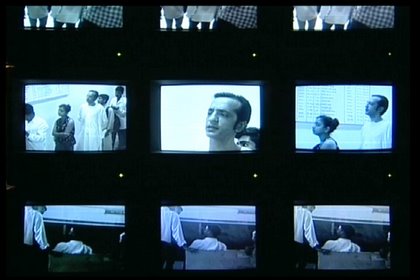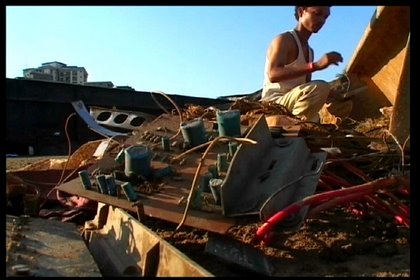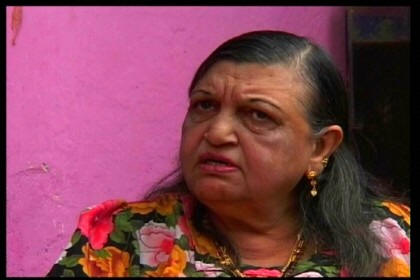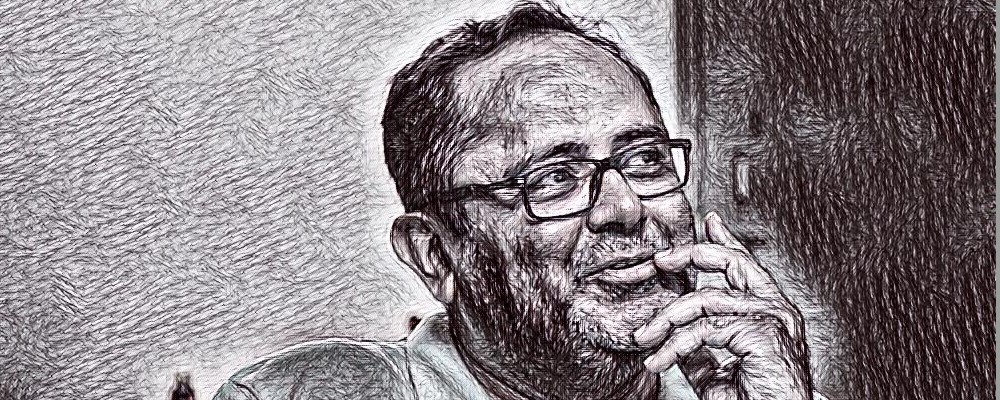7 Islands and a metro : A symphony for Bombay a review by Sunil Deepak (October 2006)
Seven Islands and a Metro - Credits Director: Madhusree Dutta; Actors: Harish Khanna & Vibha Chibbar; Cameraman: Avijit Mukul Kishore; Editing Reena Mohan, Shyamal Karmakar; Dialogue: Sara Rai; Sound design: Boby John; Music: Arjun Sen.
 It is a beautiful symphony,
played by invisible beings, the kind who walk all around you every day and whom you never see.
Perhaps, you are also one of them? Symphony is made even more beautiful because, each of those invisible beings is singing a different song,
with a different rhythm.
It is a beautiful symphony,
played by invisible beings, the kind who walk all around you every day and whom you never see.
Perhaps, you are also one of them? Symphony is made even more beautiful because, each of those invisible beings is singing a different song,
with a different rhythm.
Seven Islands and a Metro by Madhusree Dutta is that symphony. The film was released in some commercial theatres about ten days ago. It is rare that I get to see newly released films but this time, Mukul, my nephew and cameraman for this film, brought me a preview copy. Today, while I was watching it, I wished I had watched it while Mukul was here. In some Dvds there is a director’s cut of the film, where the director explains and talks about the film, while you watch the scenes. If I had watched it with Mukul, I could have had a cameraman’s cut of the film! The film is visually so rich that I really regret not having done that.
Seven islands is about some of the different Bombays/Mumbais that exist for its 15 million inhabitants and for thousands coming here every day in search of a living. Each of them sings their song.
Like the persons who hang at the top of the sky scrappers and clean glass for a living. “I like it up here, there is a kind of peace here”, one of them says.
Like the hundreds of I.D.cards of its residents with their pictures, and people standing in queues, answering questions about themselves – name, place of birth, father’s name – in English, Marathi, Hindi, Urdu…
Like the line of cement mixers trailing on the highway like giant snails, their snouts raised up towards the sky to catch the extra-terrestrial sound waves, while a helicopter drones above.
Like the girl with grey eyes, who says, “I tell people on the face that I am a bar dancer. I am not afraid. You have to be made stronger to live here. Only money counts”, and suddenly her voice cracks with emotion.
Like the angry women protesting against the "invasion" of UP and Bihar wallas in "their" city, “We’ll butcher them like fish.” Like Kulwant Kaur with icey hands in the story narrated by Manto, who listens to her husband brag about the six he killed and the seventh, a beautiful girl, he wanted to rape. Like the Dawood Bohra bank worker who says, “I was born here in 1944. When he said to me that you should go to Pakistan, I felt so bad. Why should anyone doubt my patriotism for India?”
 Like all those dead and living, living
together there in the cemeteries, the Europeans, the Church of England Christians, the Church of
Scotland Christians, the Church of North India Christians, the Italian prisoners of war, the Japanese prostitutes and
cotton traders, and the Chinese.
Like all those dead and living, living
together there in the cemeteries, the Europeans, the Church of England Christians, the Church of
Scotland Christians, the Church of North India Christians, the Italian prisoners of war, the Japanese prostitutes and
cotton traders, and the Chinese.
Like the small window above the graveyard, where a swing is moving in a small room and small feet peep out from the window and go back in. Like the tall and well built Reshma, who talks about her tom-boy days and those trying to "dial wrong number" with her. She is the stunt women, a celebrity in her area, having done stunts for Hema Malini in Sholay. “Take a look at my pictures. In my time, I was also beautiful, why didn’t I become a heroine?” Like all those small, thin men with faces burnt by sun, who rummage through garbage, who bulldoze houses of poor like themselves, and who talk of hunger, “You can wake up hungry in Bombay but you are ready for hard work, you will not go hungry to sleep.”
Like the young man selling chai during the night. Even beggers and vendors buy the tea from him. He says, “They can deflate the tyre of my bicycle, but I can’t give bribe. I don’t earn enough. They can do what they want.” Another talks about his love for the girl from the other caste and how he was made to leave for Bombay while the girl committed suicide. “For a days' labour, you earn 15 rupees in the village. Here I can spit out the betel for 15 rupees in a day.”
Cruel, funny, tragic and comic, they all mix together in a never ending kaleidoscope, each staking their claim to life. The young boy extolling the virtues of vegetarianism, almost unaware of the violence inherent in his words. Or those who talk of the riots and because their religion does not allow them to hurt others, how they "handed over" a couple they had caught to others “more suitable for doing the job”. And the hope in their eyes that refuses to die. My future will be better, they all believe. In any case, life here is much better than what ever, I left behind, they argue, perhaps more to convince themselves than others.
 The only discordant note in the
symphony comes from the comments of the two writers, Sadat Ali Manto and Ismat Chugtai, and the effort to add abstract
symbolism to the film, like the broken picture of Gandhi or the red shawl. Harish Khanna as Manto is suitably intense and Vibha Chibbar is a delight to
watch, but their philosophical posturings sound false and superfluous like the burqa clad women pushing carts with polyfoam Mumbai maps or
the burning kite or the red coloured water with I.D. pictures floating in it. Words of ordinary people are like swords, cutting and cruel
unapologetically. “No more Bihari and UP walla bhaiyas here, let them stay where they are”, says a woman bluntly. There was no need to
add abstract symbolism to this mix, it was already there in plenty.
The only discordant note in the
symphony comes from the comments of the two writers, Sadat Ali Manto and Ismat Chugtai, and the effort to add abstract
symbolism to the film, like the broken picture of Gandhi or the red shawl. Harish Khanna as Manto is suitably intense and Vibha Chibbar is a delight to
watch, but their philosophical posturings sound false and superfluous like the burqa clad women pushing carts with polyfoam Mumbai maps or
the burning kite or the red coloured water with I.D. pictures floating in it. Words of ordinary people are like swords, cutting and cruel
unapologetically. “No more Bihari and UP walla bhaiyas here, let them stay where they are”, says a woman bluntly. There was no need to
add abstract symbolism to this mix, it was already there in plenty.
They all say that it is about money. No one talks about community, or the relationships. After leaving the small towns, what communities do they create? What relationships sustain them and replace the warmth they had left in their home towns? The film does not explore them but you get glimpses of it, like the boy running along the train, who is pulled in by others hanging at the door.
The idea of watching a documentary film for 100 minutes might sound a bit daunting but once the film starts, it is difficult not to get involved and forget time. Bombay has never looked so beautiful as it looks in the rain scenes. Music, sound, images, people, everything fits so perfectly together.
At the end pf the film, I was feeling a bit jealous about Bombay. I have been there a few times, but my heart is in Delhi. I wish someone had made a symphony for my Dilli like this!
***
Back to the Home-Page - Back to Index of Avijit Mukul Kishore
